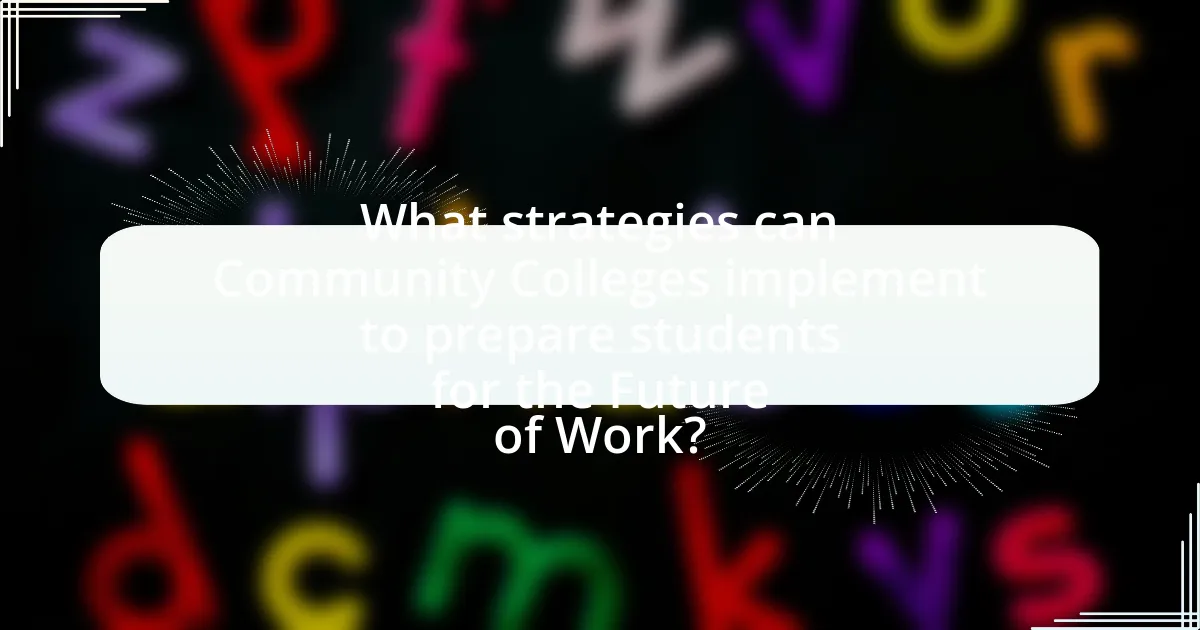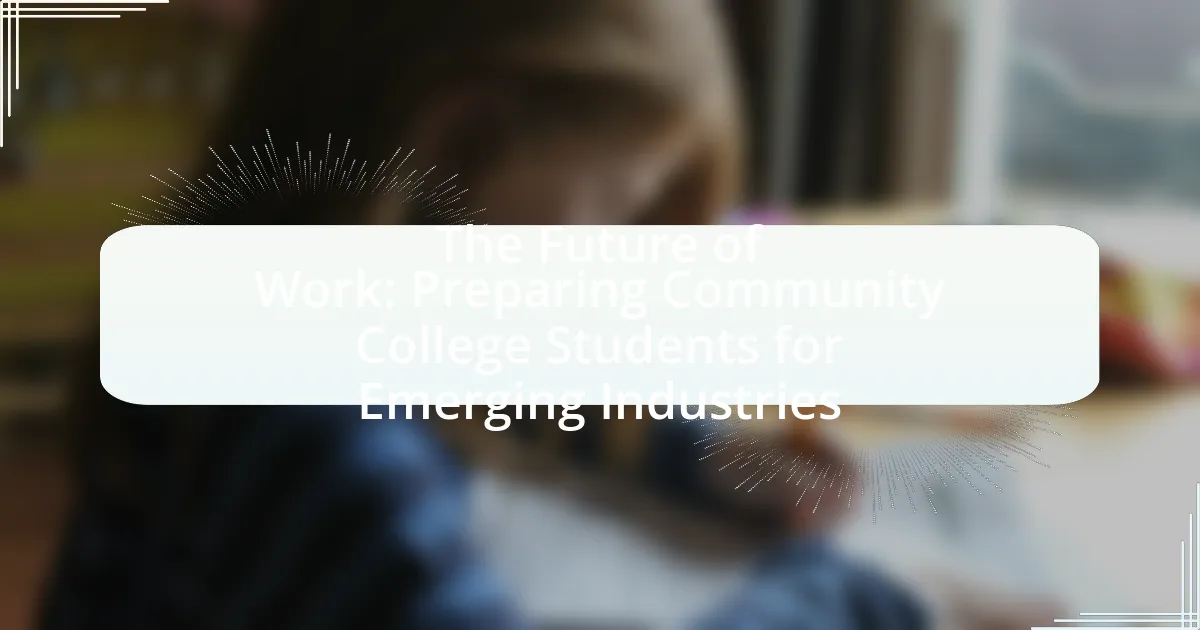The article focuses on the Future of Work and its implications for Community College Students, emphasizing the need for educational institutions to adapt to the rapidly changing job market driven by technological advancements and globalization. It highlights the importance of equipping students with relevant skills to meet the demands of emerging industries, such as healthcare, technology, and renewable energy. Key topics include the impact of automation, the significance of remote work, essential skills for success, and strategies for community colleges to enhance student readiness through industry partnerships and experiential learning opportunities. The article also addresses the challenges faced by community colleges in preparing students for these shifts and outlines best practices for ensuring student success in the evolving workforce landscape.

What is the Future of Work and its significance for Community College Students?
The Future of Work refers to the evolving landscape of employment driven by technological advancements, globalization, and changing workforce dynamics, which significantly impacts Community College Students by shaping their educational and career pathways. As industries increasingly adopt automation and digital tools, community colleges play a crucial role in equipping students with relevant skills through targeted programs that align with emerging job markets. For instance, according to the World Economic Forum, by 2025, 85 million jobs may be displaced while 97 million new roles could emerge, highlighting the need for community colleges to adapt curricula to prepare students for these shifts. This alignment ensures that graduates possess the competencies required in high-demand fields such as healthcare, technology, and renewable energy, ultimately enhancing their employability and career prospects.
How is the Future of Work defined in the context of emerging industries?
The Future of Work in the context of emerging industries is defined by the integration of technology, the rise of remote work, and the demand for new skill sets. Emerging industries, such as artificial intelligence, renewable energy, and biotechnology, are reshaping job roles and creating a need for workers who are adaptable and proficient in digital tools. According to the World Economic Forum’s “Future of Jobs Report 2020,” 85 million jobs may be displaced by a shift in labor between sectors, while 97 million new roles could emerge that are more adapted to the new division of labor. This transformation emphasizes the importance of education and training programs, particularly in community colleges, to equip students with the necessary skills to thrive in these evolving job markets.
What trends are shaping the Future of Work today?
Remote work and hybrid work models are significantly shaping the Future of Work today. These trends have accelerated due to the COVID-19 pandemic, with a Gartner survey indicating that 82% of company leaders plan to allow employees to work remotely at least some of the time. Additionally, the rise of automation and artificial intelligence is transforming job roles, with a World Economic Forum report projecting that 85 million jobs may be displaced by automation by 2025, while 97 million new roles could emerge that are more suited to the new division of labor between humans and machines. Furthermore, the emphasis on employee well-being and mental health is becoming a priority, as organizations recognize that a supportive work environment enhances productivity and retention.
How do technological advancements influence the Future of Work?
Technological advancements significantly influence the Future of Work by automating tasks, enhancing productivity, and creating new job opportunities. Automation, driven by artificial intelligence and robotics, is expected to replace routine jobs while simultaneously generating demand for skilled workers in technology and data analysis. According to the World Economic Forum’s “Future of Jobs Report 2020,” 85 million jobs may be displaced by shifts in labor between sectors, but 97 million new roles could emerge that are more adapted to the new division of labor. This shift necessitates a focus on reskilling and upskilling, particularly for community college students, to prepare them for the evolving job landscape.
Why is it important for Community College Students to prepare for the Future of Work?
It is important for community college students to prepare for the Future of Work because they need to acquire relevant skills that align with evolving job market demands. As industries increasingly adopt technology and automation, the skills required for employment are changing rapidly. According to the World Economic Forum, by 2025, 85 million jobs may be displaced by a shift in labor between humans and machines, while 97 million new roles may emerge that are more adapted to the new division of labor. Community college programs can provide students with the technical and soft skills necessary to thrive in these emerging roles, ensuring they remain competitive in the workforce.
What skills are essential for success in emerging industries?
Essential skills for success in emerging industries include adaptability, technical proficiency, critical thinking, and collaboration. Adaptability allows individuals to navigate rapid changes in technology and market demands, which is crucial as industries evolve. Technical proficiency, particularly in digital tools and data analysis, is increasingly important as automation and data-driven decision-making become prevalent. Critical thinking enables problem-solving in complex scenarios, while collaboration fosters teamwork across diverse disciplines, essential for innovation. According to a report by the World Economic Forum, 94% of business leaders expect employees to pick up new skills on the job, highlighting the necessity of these skills in the modern workforce.
How does the Future of Work impact job opportunities for graduates?
The Future of Work significantly impacts job opportunities for graduates by shifting demand towards skills in technology, adaptability, and remote collaboration. As industries increasingly adopt automation and digital tools, graduates with competencies in data analysis, coding, and digital communication are more likely to secure employment. According to the World Economic Forum’s “Future of Jobs Report 2020,” 85 million jobs may be displaced by a shift in labor between humans and machines, while 97 million new roles could emerge that are more adapted to the new division of labor. This transition emphasizes the necessity for graduates to acquire relevant skills that align with evolving job market needs, thereby enhancing their employability in a competitive landscape.

What strategies can Community Colleges implement to prepare students for the Future of Work?
Community colleges can implement strategies such as developing partnerships with local industries, integrating technology into curricula, and offering flexible learning options to prepare students for the Future of Work. By collaborating with businesses, community colleges can align programs with workforce needs, ensuring that students acquire relevant skills. For instance, a report from the American Association of Community Colleges highlights that 70% of community colleges have established partnerships with employers to enhance job readiness. Additionally, incorporating technology, such as online learning platforms and simulation tools, equips students with essential digital skills. Flexible learning options, including evening and weekend classes, cater to diverse student schedules, increasing access to education. These strategies collectively enhance employability and readiness for emerging industries.
How can curriculum be adapted to meet the demands of emerging industries?
Curriculum can be adapted to meet the demands of emerging industries by integrating industry-specific skills training, incorporating real-world projects, and fostering partnerships with local businesses. This approach ensures that students acquire relevant competencies that align with current job market needs. For instance, a report by the World Economic Forum indicates that 85 million jobs may be displaced by 2025, while 97 million new roles could emerge, emphasizing the necessity for educational institutions to evolve. By regularly updating course content based on industry trends and collaborating with employers to design programs, community colleges can effectively prepare students for the dynamic workforce landscape.
What role do partnerships with local businesses play in curriculum development?
Partnerships with local businesses play a crucial role in curriculum development by ensuring that educational programs align with the skills and competencies needed in the workforce. These collaborations provide insights into industry trends, allowing institutions to tailor their curricula to meet the demands of emerging industries. For instance, a study by the Community College Research Center found that community colleges that engage with local employers can enhance student employability by integrating real-world applications and relevant skills into their courses. This alignment not only benefits students by increasing their job readiness but also supports local economies by creating a workforce that meets the specific needs of businesses.
How can experiential learning opportunities enhance student readiness?
Experiential learning opportunities enhance student readiness by providing practical, hands-on experiences that bridge the gap between theoretical knowledge and real-world application. This approach allows students to develop critical skills such as problem-solving, teamwork, and adaptability, which are essential in the evolving job market. Research indicates that students who engage in experiential learning are more likely to secure employment and perform better in their roles, as they have already navigated challenges similar to those they will face in their careers. For instance, a study by the National Association of Colleges and Employers found that 70% of employers prefer candidates with relevant work experience, highlighting the importance of experiential learning in preparing students for future employment.
What resources are available to support Community College students in their career preparation?
Community College students have access to various resources for career preparation, including career counseling services, internship programs, job placement assistance, and workshops on resume writing and interview skills. Career counseling services provide personalized guidance to help students identify their career goals and develop actionable plans. Internship programs offer practical experience in real-world settings, enhancing employability. Job placement assistance connects students with potential employers, while workshops equip them with essential skills needed in the job market. According to the American Association of Community Colleges, over 70% of community colleges offer dedicated career services to support students in their transition to the workforce.
How can career services assist students in navigating the Future of Work?
Career services can assist students in navigating the Future of Work by providing tailored career counseling, skills assessments, and access to industry-specific resources. These services help students identify their strengths and align them with emerging job markets, ensuring they acquire relevant skills. For instance, a report by the World Economic Forum indicates that 85 million jobs may be displaced by 2025, while 97 million new roles could emerge, highlighting the need for students to adapt to changing workforce demands. Career services also facilitate internships and networking opportunities, connecting students with employers in growing industries, which enhances their employability and readiness for future job markets.
What role do mentorship programs play in student development?
Mentorship programs play a crucial role in student development by providing guidance, support, and networking opportunities that enhance academic and professional growth. These programs facilitate personalized learning experiences, allowing students to gain insights from experienced mentors who can share industry knowledge and career advice. Research indicates that students involved in mentorship programs often exhibit higher retention rates, improved academic performance, and increased confidence in their career choices. For instance, a study published in the Journal of College Student Development found that mentees reported a 20% increase in their academic performance and a 30% increase in career readiness after participating in structured mentorship initiatives.

What challenges do Community Colleges face in preparing students for the Future of Work?
Community colleges face significant challenges in preparing students for the Future of Work, primarily due to limited resources, outdated curricula, and a lack of industry partnerships. Limited funding restricts their ability to invest in modern technology and training programs, which are essential for equipping students with relevant skills. Additionally, many community colleges struggle to update their curricula to align with rapidly changing job market demands, resulting in graduates who may lack the competencies required by employers. Furthermore, insufficient collaboration with local industries hampers the development of internship and job placement opportunities, which are critical for practical experience. According to the American Association of Community Colleges, over 60% of community colleges report difficulties in maintaining partnerships with businesses, which directly impacts students’ readiness for emerging industries.
How can funding and resource limitations impact program development?
Funding and resource limitations significantly hinder program development by restricting the ability to create, implement, and sustain educational initiatives. When financial resources are inadequate, community colleges may struggle to hire qualified instructors, purchase necessary technology, or develop relevant curricula that align with emerging industry needs. For instance, a study by the American Association of Community Colleges found that 70% of community colleges reported budget constraints as a primary barrier to expanding workforce development programs. This lack of funding can lead to outdated training methods and insufficient support services, ultimately diminishing the quality of education and the preparedness of students for the workforce.
What strategies can be employed to overcome these challenges?
To overcome the challenges of preparing community college students for emerging industries, institutions can implement targeted workforce development programs. These programs should focus on aligning curriculum with industry needs, fostering partnerships with local businesses, and providing hands-on training opportunities. For instance, a study by the Aspen Institute found that community colleges that collaborate with employers to design relevant training programs significantly improve student job placement rates. Additionally, integrating technology into learning environments can enhance skill acquisition, as evidenced by research from the Community College Research Center, which highlights the effectiveness of blended learning models in increasing student engagement and success.
What are the best practices for Community Colleges to ensure student success in emerging industries?
Community colleges can ensure student success in emerging industries by implementing industry-aligned curricula, fostering partnerships with local businesses, and providing hands-on learning opportunities. Industry-aligned curricula ensure that the skills taught match the demands of the job market, which is crucial as 85% of jobs that will exist in 2030 have not yet been invented, according to the World Economic Forum. Partnerships with local businesses facilitate internships and job placements, enhancing students’ real-world experience and employability. Additionally, hands-on learning opportunities, such as labs and simulations, allow students to apply theoretical knowledge in practical settings, which is essential for mastering new technologies and methodologies in rapidly evolving fields.
How can continuous feedback from industry stakeholders improve educational outcomes?
Continuous feedback from industry stakeholders can significantly improve educational outcomes by aligning curricula with current workforce needs. This alignment ensures that students acquire relevant skills and knowledge that are directly applicable in their future careers. For instance, a study by the National Center for Education Statistics found that programs incorporating industry input saw a 20% increase in job placement rates for graduates. By regularly engaging with industry professionals, educational institutions can adapt their teaching methods and course content to reflect the evolving demands of the job market, thereby enhancing student employability and success.
What innovative teaching methods can enhance student engagement and learning?
Innovative teaching methods that can enhance student engagement and learning include project-based learning, flipped classrooms, and gamification. Project-based learning actively involves students in real-world projects, fostering critical thinking and collaboration, as evidenced by a study from the Buck Institute for Education, which found that students engaged in project-based learning showed higher retention rates and improved problem-solving skills. Flipped classrooms allow students to learn content at their own pace through video lectures and engage in interactive activities during class time, leading to deeper understanding, as supported by research from the University of Colorado, which indicated that students in flipped classrooms performed better on assessments. Gamification incorporates game elements into the learning process, increasing motivation and engagement; a study published in the Journal of Educational Psychology found that gamified learning environments significantly improved student participation and achievement.
What practical steps can students take to prepare for the Future of Work?
Students can prepare for the Future of Work by developing relevant skills, gaining practical experience, and networking within their desired industries. Focusing on skills such as digital literacy, critical thinking, and adaptability is essential, as these competencies are increasingly demanded by employers in emerging industries. According to the World Economic Forum’s “Future of Jobs Report 2020,” 94% of business leaders expect employees to pick up new skills on the job, highlighting the importance of continuous learning.
Additionally, students should seek internships, co-op programs, or volunteer opportunities to gain hands-on experience, which can enhance their employability. Research from the National Association of Colleges and Employers indicates that 60% of employers prefer candidates with relevant work experience. Finally, building a professional network through industry events, social media platforms like LinkedIn, and mentorship programs can provide valuable connections and insights into job opportunities.

Leave a Reply